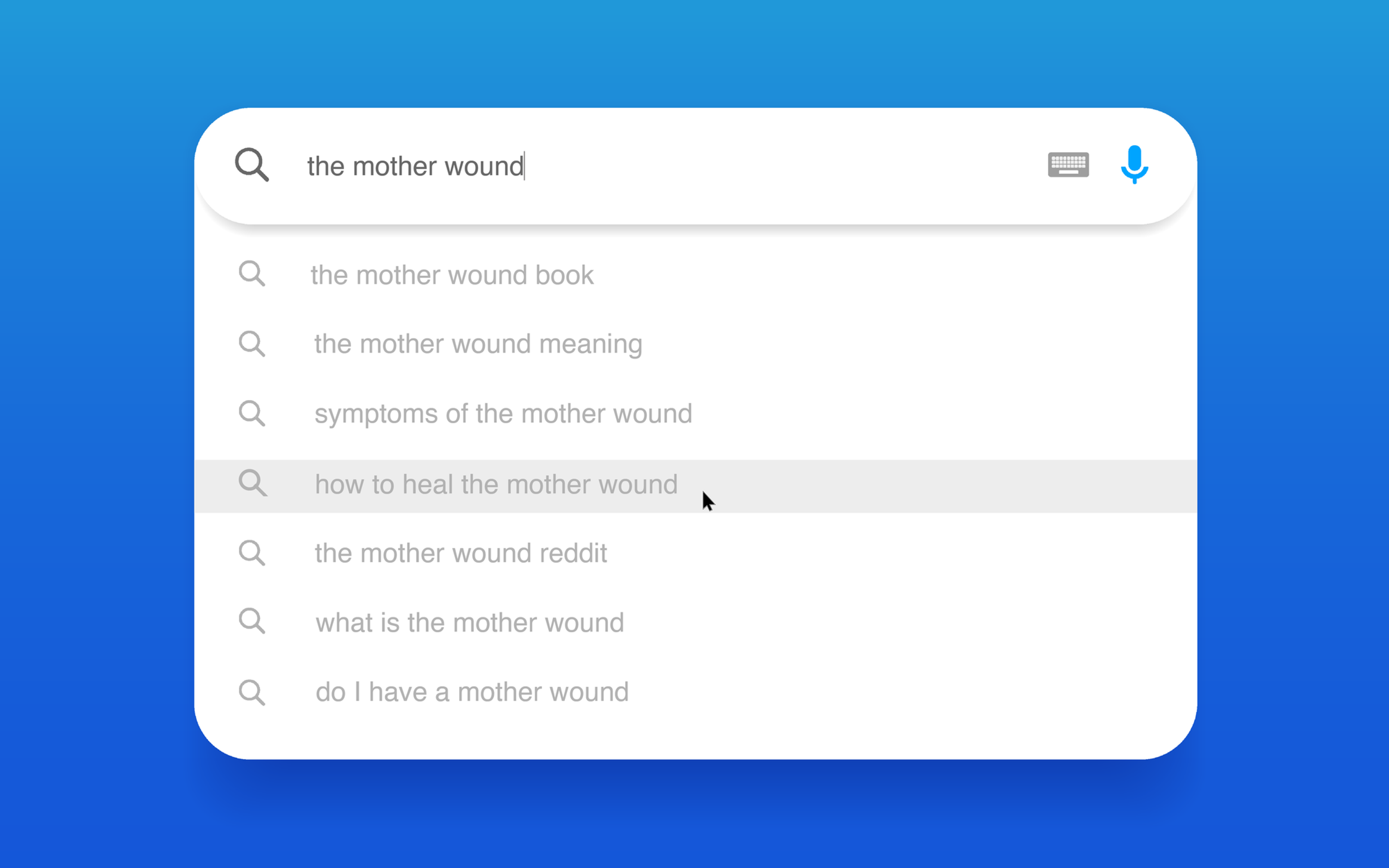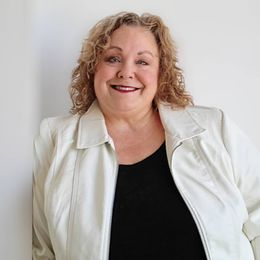Reflecting on the Mother Wound
The mother wound stems from the sexist cultural belief that anything wrong in a child's life is the mother's fault
A Google search for "mother wound" returns over 224 million results, mirroring how the topic has exploded since psychologist Bethany Webster coined the term nearly ten years ago.

Webster, who teaches women how to heal their mother's wounds, defines the term "mother wound" as "the pain of being a woman passed down through generations of women in patriarchal cultures." The mother wound stems from the sexist belief entrenched in our culture that anything wrong in a child's life is the mother's fault.
Women are held to an impossible standard to be perfect caregivers and mental health professionals often reinforce this.
Women are held to an impossible standard to be perfect caregivers, and mental health professionals often reinforce this. In the book "The New Don't Blame Mother" by Paula J. Caplan, Ph.D., she analyzed 125 scholarly articles written by mental health professionals where 72 problems, from bedwetting to schizophrenia, were blamed on mothers.
Webster included the cultural impact in her definition of mother wound because we still live in a society where women are not legally equal to men, and mothers rather than fathers are more often blamed for a child's wrongdoing or emotional pain; the patriarchal piece gets pushed to the background.
This leaves women to shoulder the responsibility not only for the suffering they experience as women but also for passing their dysfunction on to their children.
The Role of Intergenerational Trauma
The idea that trauma could be passed down through generations was first explored by the descendants of Holocaust survivors. While the initial study received pushback from the psychiatric community, which asserted that there were a limited number of participants and claimed data was anecdotal rather than scientific, it spawned numerous other lines of investigation.
The idea that trauma could be passed down through generations was first explored by the descendants of Holocaust survivors.
In subsequent studies, a higher prevalence of mood disorders and anxiety in the offspring of Holocaust survivors was discovered. This led to discussion about the impact on mental health from other events like colonization, slavery and the displacement of Indigenous peoples and African Americans.
Although it has not been proven definitively within the scientific community, the results point toward a connection between early environmental issues in a child's life and utero maternal stress and the impact of parental and ancestral experiences on an offspring's mental well-being.
Even though intergenerational trauma is not wholly sanctioned by scientists or the onus is not entirely in the right place, the pain women feel from the experiences throughout their maternal lineage includes everything from poverty and sexual violence to narcissism and emotional unavailability. This creates maladaptive coping mechanisms that can be passed on to children, who first learn by example.
Stories of Lived Experience
Regardless of how it manifests – body dysmorphia, eating disorders, addictions, anxiety, depression – the unhealthy behaviors that result from the discomfort of trauma exist, as does the emotional dysregulation that often accompanies it.
"My mother carried guilt thinking it was her fault, not understanding medicine then and how they treated women in childbirth."
The accepted practice of labeling these states as personality disorders or attaching another mental health diagnosis rather than examining the history that drives the choices bypasses the root: female oppression. Not being able to live authentically due to societal structures and mores is responsible for the mother wound, and there are plenty of examples.
Monica's grandmother died while giving birth to her mother, Catherine, who was then placed in an orphanage for the first eighteen months of her life. "My mother carried guilt thinking it was her fault, not understanding medicine then and how they treated women in childbirth," she says.
The guilt and feelings of abandonment prevented her from being present for her children and created narcissistic tendencies. "I think missing out on those critical attachment years led to her hoarding," Monica says. "She learned to attach to things instead of people."
Then, there are the secrets that create covert trauma, like the phone call from a man who identified himself as Catherine's half-brother. The woman Catherine's father married, who raised her, had given her son up for adoption.
"It was the 1940s," Monica explains, "You couldn't be a single mother." Until then, Monica didn't even know the woman she called grandmother was not her mother's mother.
Monica's isn't the only family with secrets. Judy's mother grew up with parents who often had parties riddled with prescription drugs and alcohol. "Who knows who came over and what could have happened to my mom?" she says. The chaos her mother experienced as a girl set her on a frantic quest for safety as an adult, which resulted in Judy and her brother moving nearly three dozen times while they were kids.
Along with her mother's instability were explosions of anger and a habit of walking away when things didn't go her way. Judy recalls traveling hundreds of miles to visit her aunt, and when an argument unfolded between the sisters, her mother decided to leave even though it was later at night. "We were all crying and stuff, and then my brother jumped out of the car to run back. It was just madness," she remembers.
Judy attributes her own "doomsday" thinking to her chaotic childhood. "I'm always scanning for negative things that could happen," she says. "I create scenarios in my mind so I'm always prepared."
The Depth of Trauma
Anne's mother worked two jobs after her husband died in front of the two of them. This left Anne, at 13, charged with caring for her two rambunctious brothers. On top of this trauma is "the double whammy of not being white," she says.
Her mother was Japanese and raised during WWII. "Her trauma was different," Anne says. "She grew up getting bombed and eating grasshoppers to survive." In addition, there are two mindsets around Asian women in America. "You're either the perfect, educated, high-achieving Asian woman who is also demure and knows her place," says Anne. "And then also being fetishized, even from a young age."
Staying quiet means we perpetuate what psychiatrist Judith Herman calls the conspiracy of silence, allowing inherited trauma to fly under the radar.
Yvette, an African American, was raised by parents in constant conflict, and her mother encouraged Yvette to negotiate the spats on her behalf, which sometimes turned physical.
"I've always been a mediator for my parents for as long as I can remember," she admits. Despite her best intentions not to be like her mother, she ended up replicating that chaos in her marriage.
Add to that the emotional impact of slavery on Black families. Yvette wasn't aware of how deep it ran until she saw a psychologist discussing it on social media. "She said, white women always talk up their children, telling others what a great job they're doing at this or that. That they're going to be such a success."
"But you hear many African American mothers say [their children] are not going to amount to much. You know, 'he's always stuttering' or some other criticism. She explained that was inherited trauma from slavery when a mother would do that to protect her children from being sold," Yvette notes.
Three Steps Could Lead to Change
"Noticing that things are happening and being afraid to talk about them is a major line of transmission," says Dr. Sandra Mattar, a trauma psychologist and assistant professor at the Boston University School of Medicine. The only way to change this is to acknowledge it and find a way to discuss it.
"I was shattered. I turned out to be a toxic mother."
Mary, a sexual abuse survivor and mother of three, connected the dots around the impact of female intergenerational trauma in her 40s when she began working with victims of sexual violence.
Listening to their stories, she realized she was perpetuating the harmful behavior she'd developed to cope. "I was shattered," she says. "I turned out to be a toxic mother." She began therapy, which has led to conversations with her daughters that are healing their relationship.
The absence of mothering Monica experienced caused an overcorrection with her children, who have accused her of smothering. "My one child has been clear they can only have limited contact with me. In my wanting to be there so much for them, it came off as needy," Monica says. She respects her child's wishes but says she would "rather cry it out, argue it out" to facilitate change and improve the next generation.
Whether it's addressed with offspring or not, it's still important not to deal with it alone. "You cannot do this by yourself," says Mattar. "This idea we have in Western countries of the individualistic self makes us feel so proud about being self-reliant. That is not realistic. We need to heal in the community." She adds that staying quiet means that we perpetuate what psychiatrist Judith Herman calls the conspiracy of silence, allowing inherited trauma to fly under the radar.
The second step is examining and adjusting how we raise boys, ensuring they are educated about the impact of female oppression.
Anne consciously worked with her husband to "grow young men that are good people." She was determined to teach her sons empathy and critical thinking. Hence, they understood right from wrong in areas from consent to racism because solid and confident men are less likely to behave in an abusive way.
"The truth is that if you dig a little bit, men who are abusive are very insecure," says Mattar. "The way they assert their power is to abuse women. And that needs to change." She points out that it's very convenient for men not to talk about their role in perpetuating oppression because they want to keep their social status.
"The more we talk about it, the more they will be confronted and have to pay their dues," she says. Achieving the first two steps is the only way to change the systems that are the foundation of a male-dominated society.
While the final piece is not within our control, acknowledging and working to heal the trauma inherited through the matriarchal line and implementing what we learn in raising children is something we can all do if we choose.
Then, we may see the systemic changes necessary to heal collectively.
Editor’s note: The women's names in this story have been changed to protect their privacy.


